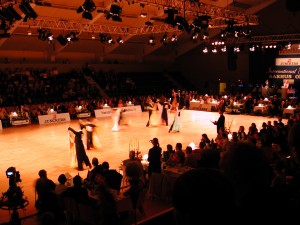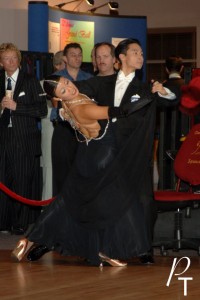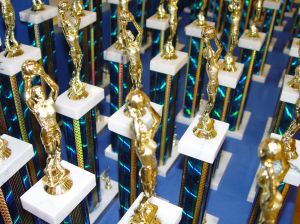Competitions: Giving You The Extra Push You Need
I remember back when I was an amateur competitor, one of my friends (outside the dance community) asked me why I chose to dance competitively. At the time, I was at the height of my competitive career, and I thought to myself, ‘The answer is obvious! First of all, I love to perform and second of all, I feed off of the competitive atmosphere, as it drives me to reach greater and greater heights.’ I think a lot of people feel the same way and that’s why they enter competitions, whether it be for Dance, Running, Bodybuilding or whatever their passion may be.
 My friend, playing the devil’s advocate (as he often does), asked me why I couldn’t pursue my dancing with the same intensity, but outside of the competition scene. After all, if I have the innate love and passion for dance that I always claim to have, then I should be driven no matter what, regardless of whether I’m involved in competition or not.
My friend, playing the devil’s advocate (as he often does), asked me why I couldn’t pursue my dancing with the same intensity, but outside of the competition scene. After all, if I have the innate love and passion for dance that I always claim to have, then I should be driven no matter what, regardless of whether I’m involved in competition or not.
Hmmm… Good point…
I suppose if I found a like-minded partner, I could have worked on my dancing solely through lessons and practice. However, I still don’t think I would have excelled as much or as fast as I did without being part of the competition scene.
 During my amateur career, I thrived on the competitive atmosphere. It definitely pushed me to work hard in order to prove to myself, the judges, my fellow competitors and the audience just how good I could be. I truly believe that the pressure of the competition environment made me strive for excellence more than if I was just practicing and taking lessons alone. Competitions were like a drug; I was addicted to the exhilaration of dancing in an environment where everyone else was just as dedicated and diligent as I was.
During my amateur career, I thrived on the competitive atmosphere. It definitely pushed me to work hard in order to prove to myself, the judges, my fellow competitors and the audience just how good I could be. I truly believe that the pressure of the competition environment made me strive for excellence more than if I was just practicing and taking lessons alone. Competitions were like a drug; I was addicted to the exhilaration of dancing in an environment where everyone else was just as dedicated and diligent as I was.
Based on my own experiences, I believe that competition can provide a very healthy and stimulating environment. You just have to have the right attitude. Competitions are there to help you grow, develop and improve your dancing. And as I often tell my students, if that’s your goal, you can achieve success regardless of what your competition results may be.
For current competitors or contemplating soon-to-be competitors, here is my advice:
- Don’t treat competition results as your only measure of success. Sure, at times, they can be helpful to see if you’ve gone up or down the ladder in comparison to other couples. However, keep in mind that every time you compete, the field keeps changing. Maybe the couples who beat you last time didn’t even compete this time. Or perhaps you made the final this time because the other couple had a bad day, or was suffering from an injury. Comparison to an ever-changing field of couples, whose actions you cannot control, is NOT a good measure of success.
- Use competitions to monitor your development. Just be careful to choose the right factors to measure your progress. If your coach is at the competition, he/she can provide you with valuable feedback. Video recording is also extremely useful, not only for yourself to see your own dancing, but also in the event that your coach is unable to be at the competition. Even comments from friends and family at times can be useful. Use all these tools to help yourself grow and develop and don’t just harp on the competition results.
 You are your most qualified judge. You know how it feels during practice, and therefore, you are the expert to know how it compared during the competition. Discuss with your partner and your coach how the performance felt. Be honest and descriptive. How did you and your partner feel today? Did you feel that you were able to achieve what you set out to do? Was it consistent, or was it only there once in awhile? Were you focused, or was your mind drifting in and out and getting distracted?Your own personal feedback is often way more valuable than the result.
You are your most qualified judge. You know how it feels during practice, and therefore, you are the expert to know how it compared during the competition. Discuss with your partner and your coach how the performance felt. Be honest and descriptive. How did you and your partner feel today? Did you feel that you were able to achieve what you set out to do? Was it consistent, or was it only there once in awhile? Were you focused, or was your mind drifting in and out and getting distracted?Your own personal feedback is often way more valuable than the result.
I remember competitions where I’ve walked off the floor, being so proud of myself and my dancing, that I didn’t care what the result was. I also remember other times when I have won or placed really high, but walked off the floor disgusted by the way that I danced. I became my most critical judge, and my personal satisfaction was more important to me than a little wooden or plastic trophy.
- Evaluate yourself both qualitatively and quantitatively. Describe your feelings as descriptively and honestly as you can. In addition to using your words, try to put a number on it, evaluating yourself on a scale of 1 to 10. Pick your goals (with your partner and your coach) and after each competition, give yourself feedback. This will provide you with your own method of comparison that is concrete and consistent.
Here’s an example: Connection – 7, felt a clear connection but noticed gapping from time to time; Tension – 5, too much muscle tension in T & QS, better in W & SF; Breathing – 1, didn’t pay attention to my breathing at all and felt totally out of breath at the end of each dance.
Remember: lessons, practices and competitions are there to help you achieve your goals. Surely lessons and practices can help you learn, grow and develop your skills to become a better dancer. But if you need that additional motivation to push you to reach greater and greater heights, at an even faster pace, competition just may be what you need!
Are you currently a DanceSport competitor or someone thinking about entering the world of compettion? Do you compete in other endeavours besides dance? Tell us why you compete and what it does for you!
If you want to check out a competition this weekend, go to the Broadway Ballroom on Saturday October 17th at 1050 W Broadway (@Oak St).


